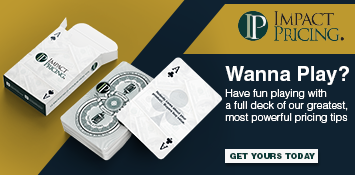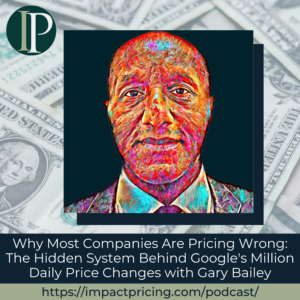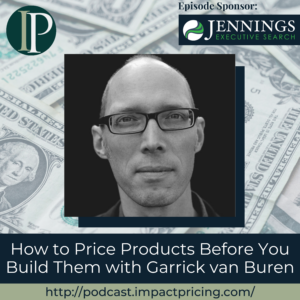Gabriel Dabi-Schwebel is the Founder and CEO of SalesDeck, an online sales communication tool. He is also the Founder and CEO of 1min30, a French inbound marketing agency. He is an entrepreneur, speaker, and author of eight marketing and sales methodologies books. Gab hosts the Virtual Selling podcast.
In this episode, Gabriel talks about service packaging as he shares how they do it in his marketing company, 1min30.
Podcast: Play in new window | Download
Why you have to check out today’s podcast:
- Find out how to get your product packaging and pricing right
- Learn good, better, best service packaging through the way a marketing company does it
- Understand why pricing is at the heart of entrepreneurship
“If you are in service, the idea of packaging what you sell is very important.”
– Gabriel Dabi-Schwebel
Topics Covered:
01:29 – Growing up with French fonctionnaire parents while wanting to become an entrepreneur
02:19 – How Gabriel got into pricing; Gabriel realizes how important pricing is
04:36 – Talking about service packaging in line with his marketing company, 1min30
08:34 – The difference between the three price points
09:54 – Where he got the idea of his good, better, best strategy
10:36 – Did Gab learn how to have value conversations with clients?
12:06 – Gabriel’s pricing advice
14:51 – Pricing table topics: “Be strategic. Focus on lifetime value.”
Key Takeaways:
“I think pricing is really at the heart of entrepreneurship, because at one time, you need to price what you do, what you sell, what you create, and it’s really a marketing aspect that is very interesting, because with pricing, you can make your revenue even bigger without working too much.” – Gabriel Dabi-Schwebel
“It’s really important to find the right price and to be sure that the price you choose is really the closest to what a customer is ready to pay and the ones that make you the more value and the more money in your pocket.” – Gabriel Dabi-Schwebel
“Really thinking about lifetime value is really thinking about what is the price being acceptable by your customer and the value you bring him, and also the fact that you keep bringing value and keep in loyal to your product.” – Gabriel Dabi-Schwebel
People / Resources Mentioned:
- SalesDeck: https://salesdeck.io/
- 1min30: https://www.1min30.com/
- Acquisition Strategy Design: https://www.amazon.co.uk/gp/product/2377740324/ref=dbs_a_def_rwt_bibl_vppi_i2
- Blair Enns’ The Win Without Pitching Manifesto: https://www.winwithoutpitching.com/the-manifesto/
Connect with Gabriel Dabi-Schwebel:
- LinkedIn: https://www.linkedin.com/in/gabrields/
- LinkedIn: https://www.linkedin.com/in/gabriel-dabi-schwebel/
Connect with Mark Stiving:
- LinkedIn: https://www.linkedin.com/in/stiving/
- Email: [email protected]
Full Interview Transcript
(Note: This transcript was created with an AI transcription service. Please forgive any transcription or grammatical errors. We probably sounded better in real life.)
Gabriel Dabi-Schwebel
Really, if you are in service, the idea of packaging what you sell is very important.
[Intro]
Mark Stiving
Today’s podcast is sponsored by Jennings Executive Search. I had a great conversation with John Jennings about the skills needed in different pricing roles. He and I think a lot alike.
If you’re looking for a new pricing role or if you’re trying to hire just the right pricing person, I strongly suggest you reach out to Jennings Executive Search. They specialize in placing pricing people. Say that three times fast.
Mark Stiving
Welcome to Impact Pricing, the podcast where we discuss pricing, value, and the dependent relationship between them. I’m Mark Stiving and our guest today is Gabriel Dabi-Schwebel. Here are three things you’d want to know about Gabriel before we start.
He is the Founder and CEO of SalesDeck, an online sales communication tool. He is the Founder and CEO of 1min30, a French inbound marketing agency. He’s the Founder and CEO – well actually, I think he’s had a job as an employee for a total of two years in his entire life. Besides that, he’s founded and started companies.
Welcome, Gabriel.
Gabriel Dabi-Schwebel
Welcome, Mark. Thanks for having me.
Mark Stiving
Hey, it’s going to be fun. So first off, how did you get this entrepreneurial bug where you’ve never really worked for anybody?
Gabriel Dabi-Schwebel
I think it’s really surprising, and my parents were the most surprised of all, because there are French fonctionnaire – how do you say that? – working at the government and working for a government organization. So, they didn’t breed an entrepreneur, but I became an entrepreneur even after good studies in France and good studies that should have made me someone from the corporate world, and I never liked it. So, I really decided from the start to create my own business.
Mark Stiving
Nice. Well, I’m jealous. I’ve done three companies in my life, but I think you’ve done like ten more than that.
Gabriel Dabi-Schwebel
Well, maybe not. Maybe six or seven all in total.
Mark Stiving
How did you get into pricing? How did you get involved with pricing?
Gabriel Dabi-Schwebel
I think that pricing is really at the heart of entrepreneurship because at one time, you need to price what you do, what you sell, what you create, and it’s really a marketing aspect that is very interesting because with pricing, you can make your revenue even bigger without working too much. So, it’s really important to find the right price and to be sure that the price you choose is really the closest to what a customer is ready to pay and the ones that make you the more value and the more money in your pocket.
During my one year of employment within Alcatel, it was about 25 years ago, I used to work on pricing and in telecom, and it was with a professor from the University of London that has invented at this time a tool to price mobile phone communication. He was working before in the oil industry and his tool was used when you go to the gas pump and you price the gallons of oil at a different price depending on the distance from the other gas pump and the place you are and stuff like that. So, he made a model for gas and he moved the model to the mobile industry.
Mark Stiving
That’s pretty fascinating.
Gabriel Dabi-Schwebel
It gave me a theory on pricing also, with the use of value propositions.
Mark Stiving
So that was the moment where you realized pricing was really important?
Gabriel Dabi-Schwebel
Yeah, and I was lucky because it was early in my career. So, all along, I really always thought about pricing not like just a subtopic that you need to find a price and what is the best price, but always thinking “what could be the limits where I can make the price higher and still be accepted?”
Mark Stiving
Nice. And so, I wish I had learned that early in my career, too, because for me, I was a salesperson, horrible, didn’t understand pricing, and I think most of us learn it later in life with some big experience that happens.
Now, when I asked you what you’d want to talk about today, what would be interesting, you mentioned service packaging, and we had a chance to talk for just a couple of minutes before we hit record. And I love the way you described what you’re doing in your 1min30 marketing company. Can you describe that to the listeners so that they can get up to speed with where we are?
Gabriel Dabi-Schwebel
Sure. 1min30 was the first inbound marketing agency in France. I started it ten years ago, after discovering an expert in inbound marketing and coming back from the media industry. At this time, I had to learn everything about marketing and service, because my other venture was more in consulting, selling only myself and SAS industry and jewelry, but it was the first time to start, really, a service company.
And then first, I worked on marketing since it was what I was selling. And then I worked in sales, and I was very bad at sales, so I had to learn sales, and selling is very special when you sell service. And what I love about this learning was really to package my offer and trying to make the selling the less heavier, because when you are in service, preparing for sales could be very long because every project is different and you need to specialize them and I don’t want to do that; it’s too costly to make a dedicated response to every leads and so on.
The idea was really to package as the beginning of my offers, and in order to package them well, I’m starting every project with workshops and action plan. And to package these workshops and action plan– yeah?
Mark Stiving
Gabriel, I want to pause you for just a second, because I think the point that you just made was really valuable and I want to emphasize it to everybody. And I think what you said – you didn’t say these words, but I’m reading between the lines.
Gabriel Dabi-Schwebel
Yeah, but your English is much better than mine.
Mark Stiving
A lot of people who are selling services essentially walk into a potential buyer and say, “What do you need? I can do anything.” And it’s really, really hard to a) sell that and b) if they want to buy anything random, then you have to build some custom solution for that customer. And so, you said, “No, I’m not going to do that. Instead, I’m going to build some packages of offerings, and now I actually have something I can go sell.” Is that accurate?
Gabriel Dabi-Schwebel
Yes, exactly. I start every of my project with each of the five books I have created, and each book, and you have them here; Acquisition Strategy Design is a book that gives a methodology to build your acquisition strategy based on collective intelligence. So, we have developed a methodology with tools, canvas to use for the first workshop. We have designed the way we present the acquisition plan at the end. And after that, we have a package really three tiers of workshop with more consulting depending on each deal in order to have an action plan being designed for acquisition at the end of this workshop and action plan.
There is the same type of book for brands. So, we have Brand Strategy Design, and we design brand action plans. There is one about customer experience; also, to have some excellent customer experience action plan. There is one about HR marketing; this is our fourth topic. And the last one is about sales process. And after all of them, the price of each action plan, each time three tiers is a €10,000, €15,000, or €20,000. And after that, at the end of the first assignment, we deliver a program that is also packaged.
Mark Stiving
Nice. And so, what’s the difference between the three price points? I was thinking, essentially, you’re creating good, better, best packages. What’s the difference in the three offers?
Gabriel Dabi-Schwebel
It’s the time we spend with the customer and the extension of the deliverables that we deliver at the end. So, the first one is really the workshop and then action plan. The second one is more about having an audit before the workshop, we’d interview with the customers, then the workshop and then action plan. And the last one is with the audits, the workshop, the action plan, and some more consulting to detail the action plan within the organization and to provide action also for the customer within his own organization.
Mark Stiving
And out of curiosity, which one do most customers buy? The good, the better, or the best?
Gabriel Dabi-Schwebel
The one in the middle.
Mark Stiving
Always. I always like to ask that just to see if it holds true forever.
Gabriel Dabi-Schwebel
The one in the middle is the most sold. After that is the cheapest one and then the highest price point.
Mark Stiving
The high end one?
Gabriel Dabi-Schwebel
Yeah.
Mark Stiving
I can absolutely see that’s true. And so where did you create your good, better, best strategy? Did that come from the Alcatel days or did that come from reading other things?
Gabriel Dabi-Schwebel
No, it’s come from reading. As a same fan, I think you know Blair Enns.
Mark Stiving
Oh yeah, I know Blair Enns.
Gabriel Dabi-Schwebel
He was my mentor about selling services. He wrote his first book, which is Winning Without Pitching, which is very interesting and learned me a lot about selling services and custom product. And what is interesting also is– yes?
Mark Stiving
I was going to say Blair does a great job, especially for marketing agencies and the way he thinks and what he talks about. I love listening to him talk. He teaches something called a value conversation, and I have a version of value conversations in my newest book, Selling Value. I’m really curious – did you learn how to give or how to have value conversations with clients, and do you do that today?
Gabriel Dabi-Schwebel
It’s not an easy conversation to have, especially in France, where it’s always difficult to talk about money. So, it’s always difficult to have really these value conversations and to help the customer project himself into success, especially when our customer asks most of the time from larger towns, corporate accounts, and they’re not directly the owner of the business. So, it’s really kind of difficult to have this kind of value conversation with them. They are more into what is the budget they have rather than what is the value they can get.
Mark Stiving
Yes. And so, do you ever try to turn that personal, as in, how do you get promoted? How do you look good inside your company in terms of value?
Gabriel Dabi-Schwebel
I think I tried, and this one is not easy, too, I would say. It’s very interesting, but it’s really not easy because the idea of being promoted is very personal and I am not sure to have really succeeded in it.
Mark Stiving
Okay. I’m just curious on how these things work in real life, in the marketing space. So nice.
Hey, we’re going to play a game, but before we play a game, let me just ask you the final question that I usually ask everybody. And that final question is, what’s one piece of pricing advice that you would give our listeners that you think could have a big impact on their business?
Gabriel Dabi-Schwebel
Really, if you are in service, the idea of packaging what you sell is very important. I package my end products to rework with the action plans that I have shown you, but I also package our program. So, our program are more customs. We do them after having done the first action plan, but those ones are also packaged because we don’t want to set programs that are fixed and miss some agility. And in order to keep agility within the program, we have designed two values, which is the number of meetings that we sell and the number of points that we sell for each program. And meetings will represent the consulting part of our program, and points will represent the deliverables of the program. You can convert all along the program your points into blog articles, into infographics, into videos, into marketing automation scenarios, whatsoever, but you keep the agility of it. So, at the beginning of the program, you fix your investment, and following the project, you spend what you have built with the help of your consultant. So, you use your credit in meeting and your credit in points, and you keep the flexibility to have an action plan that really helps you, and it is not the action plan that you have designed six months ago. So really packaging. Agility is actually very interesting.
Mark Stiving
Yeah. That’s pretty creative as to how you did that. I was thinking throughout, as you kept mentioning the word points, a lot of companies in the U.S. in the software business, SAS, they sell credits, and so I was thinking the word credits. And so, you could spend credits to buy different things. It’s almost like tokens at a game location, at a game arcade.
Gabriel Dabi-Schwebel
True.
Mark Stiving
But that’s a really nice way to say, “Look, we can still get a bunch of deliverables for you, but you don’t have to decide right now what you want in terms of deliverables.”
Gabriel Dabi-Schwebel
And what is really nice is it’s at the end of the year, because you and your budget and stuff like that. You have companies that are buying credits without knowing what to do with that, but they need to spend their budget so they buy you some credits and later you see what you do with them.
Mark Stiving
Yes, it’s like hitting you money, saying, “Hey, next year you can do something for me.”
Gabriel Dabi-Schwebel
Yeah, exactly.
Mark Stiving
Nice. Alright. Hey, Gabriel, we’re going to play a game called pricing table topics. I told you a little bit about this before we started, just so you didn’t get shocked. But for our listeners, I have a deck of cards that I made up – the Impact Pricing cards. On each card, there’s a saying, one of the memes that you’ve probably seen me put out on LinkedIn, and what we’re going to do is we’re going to read one of these cards to Gabriel and he gets to talk between one and two minutes on this topic. We happen to pull the nine of clubs. Nine of clubs; can’t really see it. And Gabriel, here’s what it says – “Be strategic. Focus on lifetime value.” You’ve got one minute.
Gabriel Dabi-Schwebel
Well, what a topic. Lifetime value is really a key metric within SAS, and SalesDeck.io is my last venture; it’s a SAS product to make better customer meeting – more better prepared, more engaging, and more documented customer meetings. And it’s true that you want your product to have the biggest and the longest lifetime value, and there are two factors for that. So, the first one is the price, but the other one is churn, or it’s the period of time that the customer stays with you. And really thinking about lifetime value is really thinking about what is the price being acceptable by your customer and the value you bring him, and also the fact that you keep bringing value and keep in loyal to your product. Yes.
Mark Stiving
Alright. That was perfect, Gabriel. That was perfect. Thank you so much, and also thank you very much for being on the podcast today. If anybody wants to contact you, how can they do that?
Gabriel Dabi-Schwebel
It’s easy. You can find me on LinkedIn. I have two LinkedIn accounts. One for 1min30 – Gabriel Dabi-Schwebel – and the other one is for SalesDeck. And you can also join me on https://salesdeck.io/, the website of our new venture.
Mark Stiving
Alright. Episode 186 is all done. Thank you so much for listening. If you enjoyed this, would you please leave us a reading and a review? Also, if you liked this podcast, your pricing colleagues might, too. Please help them find this. And finally, if you have any questions or comments about the podcast or pricing in general, feel free to email me: [email protected].
Now, go make an impact.
Mark Stiving
Thanks again to Jennings Executive Search for sponsoring our podcast.
If you’re looking to hire someone in pricing, I suggest you contact someone who knows pricing people. Contact Jennings Executive Search.
Tags: Accelerate Your Subscription Business, ask a pricing expert, pricing metrics, pricing strategy
















